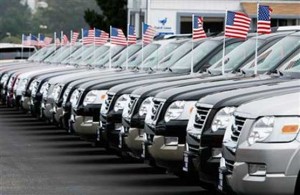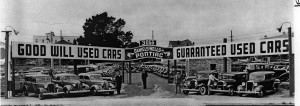
Some Chrysler and GM dealers whose franchises have been yanked have quickly gravitated to becoming well-housed "independent" dealers.
When Business Week brought me up from the minors 52 years ago, I arrived in Motor City the day the Edsel officially went on sale, the most exciting news of the 1958 model year.
I doubt anyone realized the intro also signaled the beginning of Detroit’s worst recession in more than a decade. Car sales in 1958 dropped by 35% from the banner year of 1955.
My first solo BW assignment a few weeks later was an introduction to market prognosticating in the automobile business. “Go out on Livernois Avenue and talk to the used car dealers,” the bureau manager directed me. He told me the conventional wisdom was that as used car sales go, new car sales will not be far behind.
I can remember talking to the used car lot denizens about the interest-or lack of same-by the proverbial “southern buyers” of the time. Wholesale buyers for car dealers then came north to Detroit seeking good iron at bargain prices.
The industry’s culture meant many workers, especially at upper levels, bought a new car every year, their trade-ins producing scads of good used cars. And Detroit wholesale prices were lower both because of ample supplies and the fact the city’s used cars weren’t burdened with the cross-country transportation charges tacked onto new ones. Southern dealers knew they could get their purchases home cheaper than the standard charges the industry assessed before uniform national prices for transportation became the norm.

The industry's culture meant many workers, especially at upper levels, bought a new car every year, their trade-ins producing good used cars.
Without digging through the rusty file cabinet out in the garage for my old clips, I frankly don’t recall what conclusions about forthcoming new car sales my reporting turned up so many decades ago. Anyway, that was long ago in a different, narrower world.
So the question is, does the conventional wisdom then still hold that used car sales predict change in the new car market?
My quest started with Nick, a guy I know from the little Woodward Avenue eatery where we sometimes run into one another at breakfast. Nick used to be sales manager for a franchised new car dealer, then switched to selling used. Now, though, he’s a licensed realtor and happily was just about to close on his first house deal. Why’d he quit the car business, I asked. Two reasons, he told me. With real estate, he didn’t have to own the inventory. Second, and this was what got my attention, he told me there was a shortage of used cars.
Nick had to gulp down his coffee and hasten off to the closing, but I can speculate on why there was a shortage of used cars and trucks. Older vehicles still have to be replaced for a variety of reasons and, in a recession, hard-pressed retail buyers may be more likely to purchase less costly late-model used than new. In addition, dealers facing hard times from depressed new vehicle sales try to keep their business afloat with service, parts, body shop and used car sale, and they need more “clean cars” for the used inventory. Some Chrysler and GM dealers whose new car franchises have been yanked have quickly gravitated to becoming well-housed “independent” dealers. And the franchised, or formerly franchised dealers have more access to financing sources than the independents.
But one swallow doesn’t make a summer, as the old saying goes. The smoke signals are sending mixed messages about the state of the used car business nationally. On one hand, trade reports say used car sales rose 4% in June 2009 over the same month of 2008 for independent dealers; prices of used cars sold by both independent and franchised dealers also increased. On the other, June is historically the best month of the year for used car sales. Moreover, according to data from CNW Research, June 2008 was the worst year for used cars in years, so a modest year-over-year improvement is nothing to write home about, much less to crow for TDB. Also the finance arms of the auto companies still continue to take huge write-downs and the value of leases, hardly the sign of strong demand.
As to the supply of used cars, on a national basis, CNW said it amounted to 60.23 days’ sales at the end of June, the lowest since 2007 but well below the supply of other years at the same time, as high as 72 days’ supply in 2001 and 82 in 2000. So Nick’s observation about a shortage of good cars available might hold up. But this is a national average, not applicable except in general terms to local car markets.
Does this mean a widespread strengthening in new vehicle sales? I think we’ll just have to wait for a few more cards to be turned face up, a few more tea leaves to settle, a few more months of sales reports as the seasonally adjusted annual selling rate remains below 10 million in the U.S.
Still, strength in vehicle sales, even if modest and not fresh off the new car carrier, is good news for the industry and the economy.

